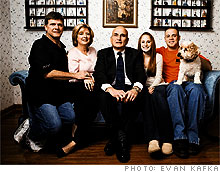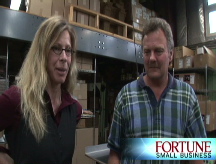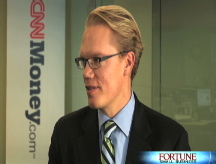The stranger among us
As more family firms hire outside managers, awkward transitions abound. Smart owners explain how they get the most gain for their pain.
 |
| Larry, Pam, Georgie, Phil and family pet/head of security Creamy - plus CFO Anthony Cino |
(Fortune Small Business) -- Watching their 5-year-old daughter frolic on the lush lawn of the hotel while vacationing at Disney World, Larry and Pam Mirable should have been happy. After all, a weeklong family vacation was a rare treat for the couple, who own Migu Press, a fast-growing printing company in Warminster, Pa.
Instead, the Mirables were filled with dread. Their eight-year-old company's growth streak had turned ugly. Orders were pouring in so fast that they could hardly keep up with billing. New customers were slow to pay, and managing the firm's cash flow suddenly had become a nightmare. Migu Press and its 30 employees had outgrown their cramped offices, but a long-anticipated move into a spacious new facility cost far more than expected - $200,000.
The relocation sucked every penny out of the budget, and the Mirables were worried about making the next payroll. Were they broke or rich? Lost in a financial fog, they didn't know.
"We were ready to throw in the towel," Pamela Mirable recalls.
In despair, the Mirables agreed to hire a CFO who could put them back on a solid financial footing. Just the thought of opening the company's books to a stranger made the couple squeamish.
"Like many entrepreneurs, we're very private about managing money," Pam says, "but the CFO had to know everything about our finances and mistakes. We thought we would be scolded like children for our knowledge gaps."
Surrendering financial control was even more difficult. Within months, however, the Mirables realized that they had made the right move. Their new CFO, Anthony Cino, saved them $40,000 in federal corporate taxes in his first year on the job. He fixed the billing mess and established a line of credit for the firm.
"Once I put financial controls in place, the Mirables were able to take advantage of growth opportunities," says Cino.
Freed from bookkeeping hassles, they focused on their customers with renewed energy. Migu Press's revenues topped $5 million in 2007, up more than 10% from 2006. In retrospect, bringing in a professional manager "was the hardest but best thing we ever did for our business," Pam says.
When to go pro
Hiring expert management for the first time marks a critical turning point - and often a crisis - in the life of a family business. Retirement planning is frequently the impetus. After years in the trenches, who doesn't daydream about turning over the day-to-day work of running a business to a competent manager?
Sometimes lickety-split growth sparks change, as in the case of the Mirables. And in other situations family-owned companies are forced to search for outside help after an owner's sudden death or disability. If there is no heir apparent - and not every clan can produce a CFO or CEO - families may have no alternative but to look beyond relatives. No matter what prompts the decision to hire an outsider, making it happen is a delicate - and perilous - operation.
The topic is growing hotter at dinner tables across the U.S. Millions of family-owned firms are beginning to look into retaining professional management, or will do so in the next few years. One reason: The mass retirement of baby-boomer business owners. According to the Exit Planning Institute in Palatine, Ill., an advocacy group for financial planners, 12 million boomer owners will retire from their firms in the next decade, either selling out or turning the company over to children or professional managers.
The pressure of abiding by Sarbanes-Oxley, the 2002 law that intensifies regulation of corporate finances and governance, is also spurring the professional-management hiring trend.
"Even private companies are finding they need to comply with Sarbanes-Oxley," says Eric Flamholtz, a professor of management at UCLA's Anderson School of Business. "They are more valuable if they install financial controls as strict as those required of public companies."
Family businesses with younger owners at the helm are also under pressure to recruit outside talent these days. Heightened global competition is a factor.
"For a family business to survive in a hypercompetitive marketplace, it may have to look outside the circle of kin for specific talents," says Andrew Keyt, executive director of the Family Business Center at Chicago's Loyola University.
Still, it can be tough to welcome a stranger into the fold. "No one in their right mind wants to be the first one in the door of a family business," says Flamholtz. "That's the sacrificial lamb." (And there's the problem of cutting the lamb loose if things don't work out - the outsider has been privy to some of the family's most intimate financial secrets.)
Consider one telling, if unsubstantiated, expectation cited by family-business experts: The first outside manager hired by a family-owned and family-run business - usually a CFO - generally lasts only a year.
Why? CFOs are typically highly organized and conservative - after all, their job is to enforce strict financial discipline. In contrast, many family businesses can be pretty easygoing about money. To an owner, allowing the children to dip into the petty-cash drawer for candy might be no big deal. To a CFO, especially one trained by a public company to account for every penny, that kind of laxity seems almost criminal.
Then there's the Uncle Fred factor. Almost every family business seems to have one. He may be a do-nothing freeloader or a meddling know-it-all who stays on the payroll simply because no one else will have him. Outsiders who can't accept such quirky business practices will have a difficult time operating in a family-owned company.
"Uncle Fred is simply a cost of business - just as fancy leased cars are a cost of business for some Fortune 500 firms," says Michael McGann, managing director of Telos Group, a family-business consultancy in Philadelphia. "If Uncle Fred gets paid and putters around quietly, that's fine. If he creates chaos in the company, well, then you've got trouble."
-
The Cheesecake Factory created smaller portions to survive the downturn. Play
-
A breeder of award-winning marijuana seeds is following the money and heading to the U.S. More
-
Most small businesses die within five years, but Amish businesses have a survival rate north of 90%. More
-
The 10 most popular franchise brands over the past decade -- and their failure rates. More
-
These firms are the last left in America making iconic products now in their twilight. More










